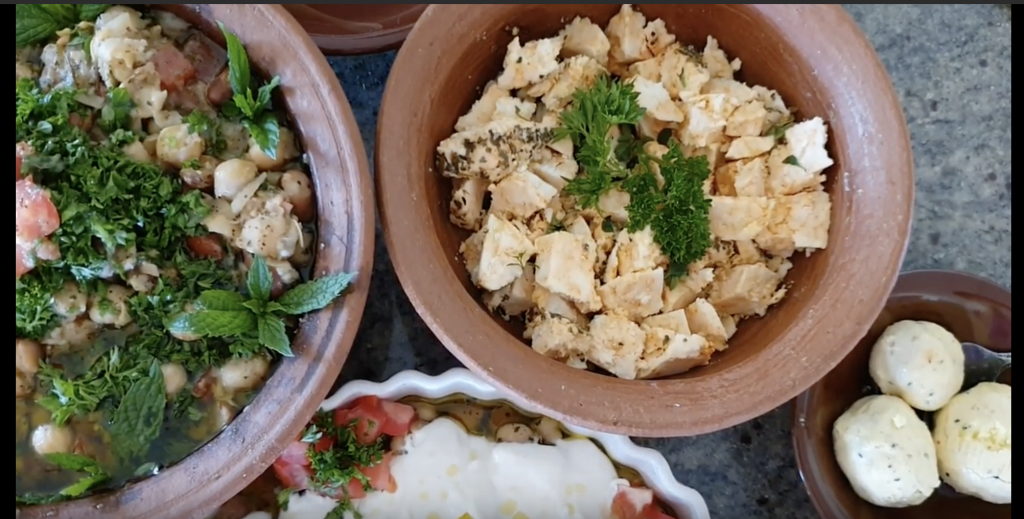Foul, or ful, is traditionally eaten for breakfast (or sometimes supper*) in Syria. The main ingredient is broad (fava) beans. Delicious and healthy, there are quite a few variations of foul, and they include vegan or dairy, depending on whether you choose to add yoghurt or not.
The two variations of foul dishes seen in this video were prepared by a Syrian Australian originally from Damascus and offered to a very appreciative Anglo Australian (me).
The most delightful part of the meal was actually not eating the foul with the side dishes of homemade pickles, shanklish, labneh balls, and a bit of mint and onion, but soaking up the flavoursome juices (lots of olive oil) with bread.
(The mint and onion are to help digestion, apparently. Before swallowing your mouthful of foul – picked up in bread, not with a spoon or fork – bite on a petal of the onion and a leaf or two of mint. It adds another taste dimension to the meal.)
It is not easy to eat as delicately as a Syrian, dipping a small folded piece of flat bread (what is often referred to as Lebanese bread) into the foul to pick up the yummy mixture of beans, chick peas, olive oil, herbs, spices, garlic, and/or tahini and yoghurt with garlic. Lots of practice is needed, but it’s worth persevering. And whether you do it like a native or not, you should still be able to get the food to your mouth – picked up in the small pieces of bread (no cutlery!) – with few mishaps.
In Egypt, foul is apparently the most traditional breakfast (like porridge in Scotland, I guess). This video shows the trick to scooping the foul up with bread – but you must stay alert or slow the video down to see how it is done! (There is a wonderful line in this video: “For every Egyptian, foul is not just food; it’s their culture and life”.)
There are other variations of foul recipes on the internet. For example, there’s this version of ‘Fave Beans Syrian Recipe – (Foul) by Easy Life‘. The cooking instructions are given in Arabic. If you don’t speak that, don’t worry. It’s worth watching the video if only to realise how easy it is to make foul – whatever recipe you choose!
Some cooks may have secret ingredients, but there are so many variations which means you can’t really go wrong making foul. Almost anything goes. (One key to success, apparently, is to use canned broad beans rather than boil up the dried beans from scratch.)
This website – ‘Simply Lebanese‘ – presents a Lebanese recipe for foul. (Some people might claim it’s a Syrian recipe, but it is hardly worth quibbling about. In that part of the world, there are city to city variations on recipes, and family to family variations, etc.)
BTW don’t forget the lemon juice!
Susan Dirgham
Editorial Team
*This asterisk is reminding me to fact check this point. (I was told foul is never eaten for one of the three meals. But which one?)
